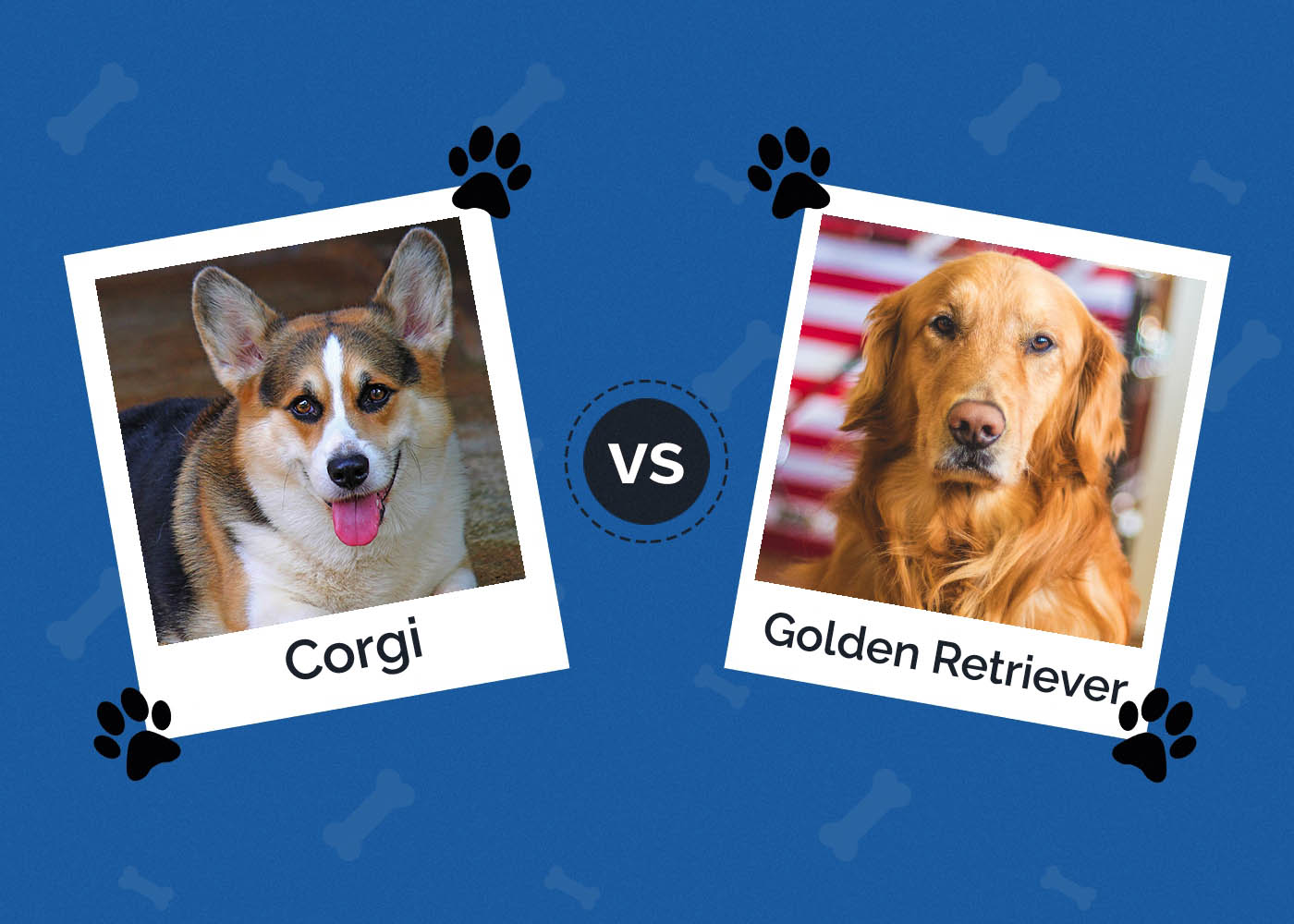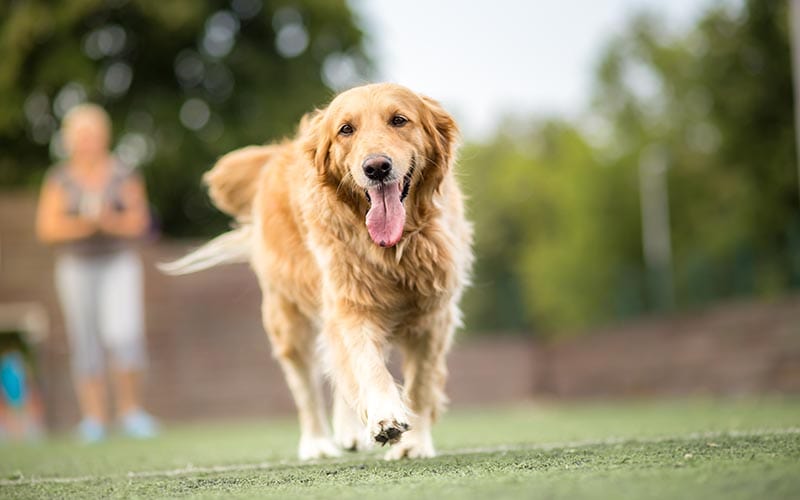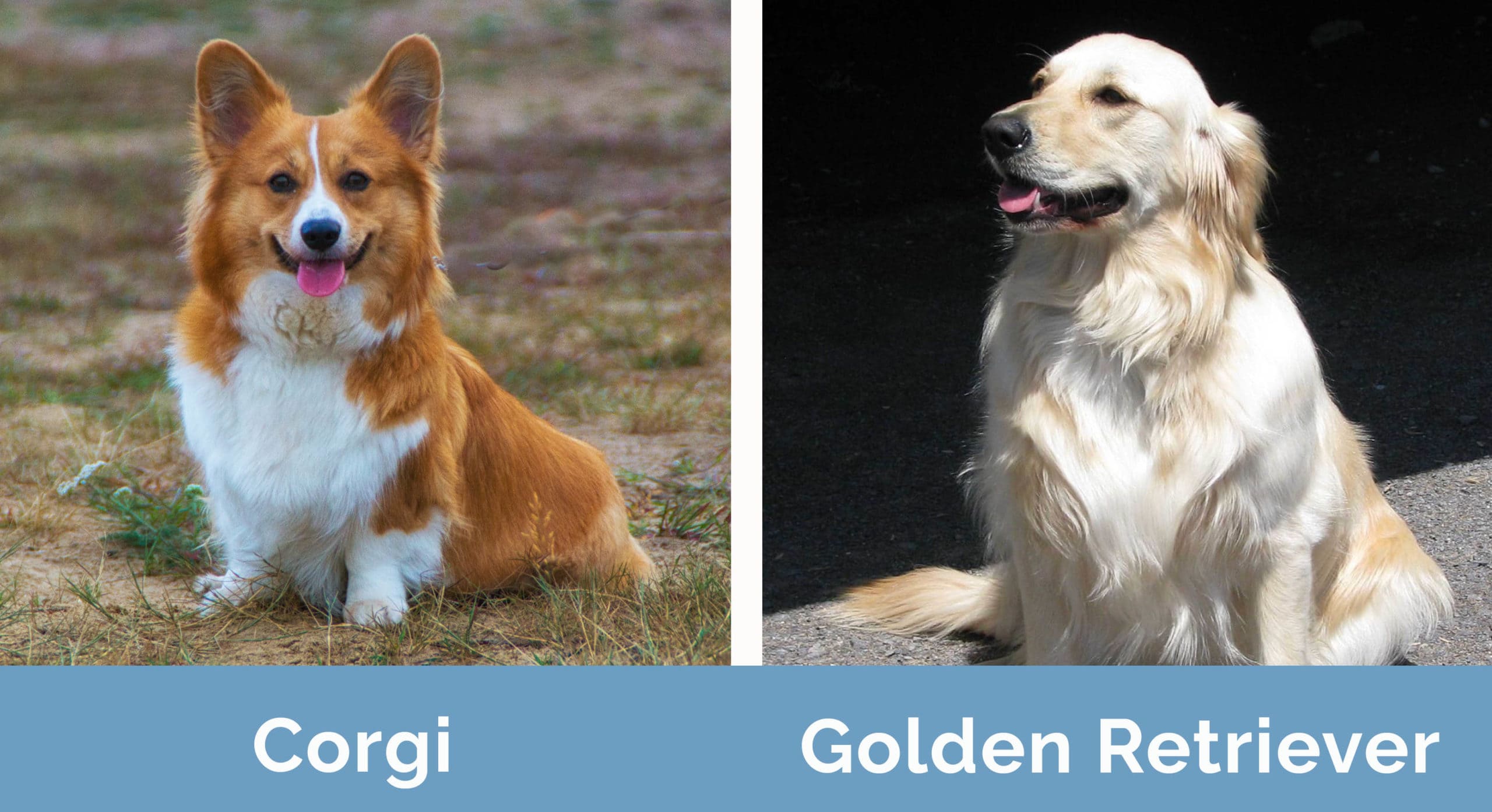Corgi vs Golden Retriever: Which Do I Choose? An In-Depth Comparison

Updated on

Regarding iconic dog breeds, Pembroke Welsh Corgis and Golden Retrievers are among the top contenders.
Corgis are so well-loved, particularly in Great Britain, but have gained popularity everywhere for their stocky, energetic bodies and alert, affectionate nature. They idolize their humans and are always eager to please and to learn.
Golden Retrievers are known for their affable and gentle nature, as well as their beautiful silky coats. They are great companions for single people or families, have lots of energy, and are as happy to cuddle on the couch as they are to romp at the dog park.
If you’re trying to choose between the two breeds, keep reading for information that can help you make the best choice.
Visual Differences
At a Glance
- Average height (adult): 10–12 inches at shoulder
- Average weight (adult): 27–30 pounds
- Lifespan: 12–15 years
- Exercise: 1+ hours a day
- Grooming needs: Moderate-High
- Family-friendly: Yes
- Other pet-friendly: Often
- Trainability: Respond well to training
- Cost: $700–$1500 for a purebred
- Average height (adult): 20–24 inches at shoulder
- Average weight (adult): 55–75 pounds
- Lifespan: 10–12 years
- Exercise: 5+ hours a day
- Grooming needs: High, very prone to shedding
- Family-friendly: Yes
- Other pet-friendly: Often
- Trainability: Easy to train
- Cost: $1000–$3000 for a purebred
Pembroke Welsh Corgi Overview
Personality / Character

Corgis were bred to help farmers herd cattle and sheep, gather flocks of chickens and geese, and guard farms. They rose to great popularity as the constant companions of the late Queen Elizabeth II. Corgis are very bright and alert. They are always looking to their humans for companionship and play, and are known for being affectionate and loyal.
Despite their relatively small size, they have a “big dog” attitude; they alert their humans to danger and are very sensitive to the environment around them, jumping into action when needed. They’re good with children and other pets in the home.
Training
Because they are working dogs, they are easy to train and have the energy and stamina to put in long days with their humans. Corgis are very intelligent and love learning.
Exercise
Corgis need plenty of daily exercises; they’re fine living in apartments as long as they get several daily walks. Lack of exercise can lead to boredom and destructive behavior. Even though they may look like they can’t move very fast because of their short little legs, Corgis can actually pick up quite a bit of speed.
Health & Care
Corgis are generally healthy dogs and are bred to reduce the likelihood of conditions, such as hip and elbow dysplasia, hypothyroidism, and von Willebrands’s disease. Corgis need high-quality dog food and access to fresh water at all times.
Corgis are double-coated, which means they have a long topcoat over a thick undercoat. They’re heavy shedders and need daily brushing and regular grooming. Teeth-brushing and nail trimming should be part of their routine care as well.

Suitable For:
Corgis are suitable for most people in any living situation, as long as they are able to meet their physical and emotional needs. They need a lot of affection and stimulation; they love to play and feel purposeful. Corgis who are left alone inside or in a backyard will quickly become lonely and understimulated. Anyone who adopts a corgi needs to be ready to provide regular exercise and stimulating activities, like new toys or trips to dog parks. Corgis are a very good match for people with children.
Golden Retriever Overview
Personality / Character

Golden retrievers were originally bred to help hunters retrieve waterfowl. They maintain their working dog nature today; they are highly intelligent, easy to train, and love to learn new tricks and tasks. They are happiest with their human family and need lots of affection and interaction from their owners.
They do not have a strong instinct to guard and protect; they will most likely greet a stranger with some excited tail wagging. Goldens are wonderful with children and an ideal family dog. They are sweet and mellow and want to make their favorite people happy.
Exercise
Goldens need a lot of regular and vigorous exercise, like walks in the neighborhood, time at the dog park, frisbee, catch at the beach (they love playing in the water), or time at the park. The key to good behavior is making sure they are physically and mentally challenged each day. Without this, they are prone to destructive behavior and low moods.
Training
Golden retrievers are among the smartest breeds of dogs and are very receptive to training. Teaching them new tricks and skills is an important source of mental stimulation and can prevent destructive behavior.
Health & Care
Golden Retrievers are famous for their beautiful coats—but such loveliness comes with a price. They are notorious for shedding, and while they shed more at certain times of the year, your home will likely always be a magnet for their hair. Daily brushing can certainly reduce the amount of hair in your environment, but it will never be nonexistent.
Goldens are generally healthy dogs and are bred to reduce the likelihood of conditions, such as hip and elbow dysplasia, hypothyroidism, and von Willebrands’s disease. They need high-quality dog food and access to fresh water at all times. Teeth-brushing and nail trimming should also be part of their routine care.

Suitable For:
Golden Retrievers are suitable for anyone who can keep up with their affection, playfulness—and their shedding! They need lots of exercise and do not like being left alone for extended periods of time. So, if you work long days or travel often, they are not the breed for you. If you’re looking for a family dog, Golden Retrievers are an ideal choice.
Which Breed is Right for You?
Even though Corgis and Golden Retrievers look very physically different, they have quite a bit in common when it comes to their personalities and physical needs.
Both were bred as working dogs, and need a lot of exercise and physical/mental stimulation. Long walks, teaching tricks, and a variety of toys keep both goldens and Corgis happy. They both need regular brushing to keeps their coats looking their best. A home with children will make bring out the playful and patient side of both breeds.
Corgis are the smaller of the two, and may be the better choice for someone living in an apartment. But, they still need multiple walks a day. Goldens are probably the more relaxed and affable of the two breeds, but not by much. If you’re looking for a dog that offers some protection and has more of a guarding instinct, definitely choose a Corgi. As we mentioned earlier, Golden Retrievers love virtually everyone and are not prone to barking at strangers—which could be a pro for some people and a con for others.
Conclusion
Overall, you really can’t go wrong with either Corgis or Golden Retrievers; both breeds are popular for good reasons and have earned their reputations as intelligent, affectionate, and playful. Ultimately, your decision should be based on your living situation and your needs/wants from a dog. But rest assured, either dog will enrich your life and be a true member of your family.
See also:
- Pembroke Welsh Corgi Vs Pomeranian: Which One Is Right for Me?
- Golden Retriever vs. Border Collie: How Are They Different?
Featured Image Credit: (L) Hel Destro, Shutterstock | (R) Caleb Fisher, Unsplash













